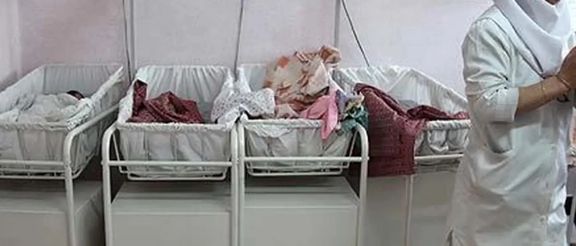Iran steps up war on abortion with anti-abortion centers in 250 cities

Iran has established anti-abortion centers in 250 cities, preventing 4,700 abortions, according to a Health Ministry official.

Iran has established anti-abortion centers in 250 cities, preventing 4,700 abortions, according to a Health Ministry official.
In an interview with the Iranian Labor News Agency (ILNA) on Saturday, Saber Jabbari-Farouji, head of Iran’s Health Ministry's Population Youth Department, disclosed that the centers are part of the "Nafas" intervention group.
The group operates in locations frequently visited by pregnant women contemplating abortion and collaborates with the likes of pregnancy diagnosis labs, gynecologists' offices, midwives, general practitioners, and the national health network, including hospitals, to deter a woman considering an abortion.
Supported by the IRGC's Basij organization, it is believed that around 60 percent of women reportedly reconsidering after the interventions.
“In some instances, the mother may not disclose her intention to abort. Instead, the child's father, relatives, or even neighbors might inform us," Jabbari-Farouji said.
"These groups then establish an emotional connection with the mother, investigating the issues she faces. Based on these identified problems, they advise her against terminating the pregnancy."
Observers have likened the Nafas group centers, dubbed “anti-abortion patrols,” to Iran’s hijab enforcement units. In March 2021, the Iranian parliament passed a law banning public health services from offering family planning, including contraceptives, vasectomies, and tubectomies, except when a woman's health is at risk.
In May, 16 human rights organizations condemned Iran’s restrictive sexual and reproductive policies, calling for the repeal of discriminatory laws.
In a joint statement, they said that in the past decade, Iran has intensified efforts to limit women’s fundamental rights, particularly in reproductive autonomy saying the trend "reflects a broader pattern of increasing restrictions on women’s rights". Just recently, the UN branded Iran's policy towards women and girls "gender apartheid".
"Under the guise of addressing declining population growth, the government has introduced discriminatory legislation that severely limits access to essential sexual and reproductive healthcare and family planning services. These measures criminalize healthcare providers and strip women of bodily autonomy, perpetuating systemic discrimination,” the joint statement read.
Abortion in Iran is largely prohibited, with only a few exceptions. Following the Family Protection and Youth Population Law enacted in 2020, abortions require official permits.
According to Article 56 of the Family Protection and Youth Population Law, unauthorized abortions are punishable by fines, imprisonment, and revocation of medical licenses with the coroner’s office responsible for filing cases for those seeking abortions. However, underground abortions are common in Iran as women lack free access to contraception and means of escaping unwanted pregnancy.
Back in 2022, Saleh Ghasemi, head of the Center for Strategic Research on Population, said that "only three percent of abortions [in Iran] are legal, and two percent of abortions are spontaneous." He also said that only four percent of abortions happen due to what he called "illegitimate relations".
The ban on abortion in Iran has made women go to illegal and often unsafe centers to terminate their pregnancies, causing the death of many women and sometimes causing lifetime complications.
Jabbari-Farouji further stated that the main reasons for seeking abortions include unwillingness to have more children, economic hardships, and untimely pregnancies. He noted that 30 percent of abortion permit applicants cited economic hardships as their reason.
Iran has been grappling with inflation exceeding 40 percent annually over the past five years, alongside low wages and a devaluing national currency.
Despite these economic challenges, Iran’s Supreme Leader Ali Khamenei prioritizes increasing the population, viewing it as essential for the Islamic Republic’s position as a leading Shia country in the Muslim world. Khamenei’s emphasis has led to increased coercive measures against contraception and abortion.